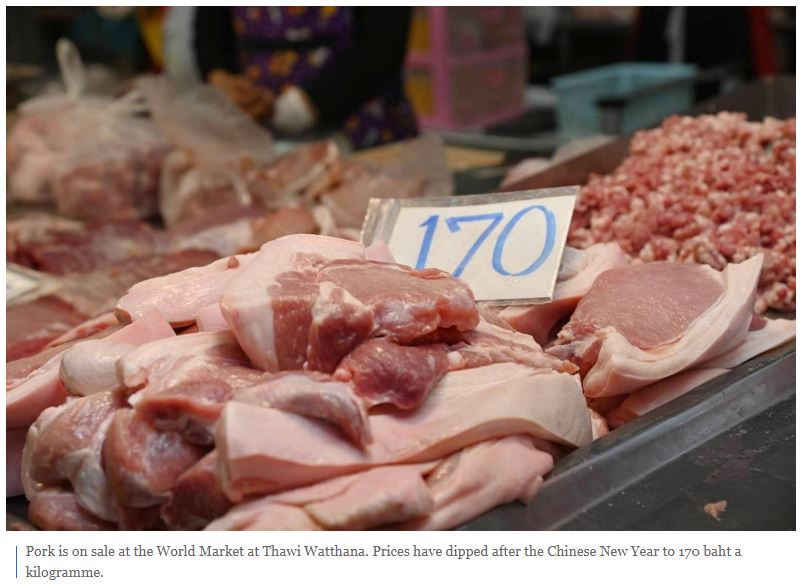Thailand: Food prices in decline as festival ends
The prices of pork, chicken and eggs are poised to drop after the end of Chinese New Year festivities, according to the Internal Trade Department.
Speaking after an on-site inspection of prices at the World Market at Thawi Watthana on Thursday, Wattanasak Sur-iam, director-general of the department, said overall prices, especially for pork, chicken and eggs, are expected to decline after the festival, which ended on Tuesday.
According to Mr Wattanasak, red pork prices in greater Bangkok are at 170-180 baht per kilogramme, down from 250-300 baht/kg before Chinese New Year.
Pork prices in other provinces have dipped to around 200 baht/kg.
He attributed the price decline to cooperation from all responsible parties, official inspections of pork stocks, and the release of supply to the market.
“The ex-farm prices of pork have dropped below 100 baht/kg,” said Mr Wattanasak.
“Pork prices are expected to drop soon, in line with actual costs.”
He said the prices of fresh chicken now average 65-80 baht/kg, while No.3 eggs — a popular size with consumers — are quoted at 3.33 baht apiece, in the range allowed by the Commerce Ministry.
The price of vegetables remains at normal levels, said Mr Wattanasak. Chinese kale is still 25 baht/kg, while Chinese cabbage is priced at 20 baht/kg, morning glory 20 baht/kg, and coriander 130 baht/kg, he said.
Regarding bottled palm oil for cooking, Mr Wattanasak admitted its price remains relatively high. The department has already asked for cooperation from manufacturers, wholesale and retail outlets to maintain their sales prices at an average of 59-62 baht per bottle.
He attributed the higher prices mainly to labour shortages in Indonesia and Malaysia because of Covid-19 outbreaks.
Mr Wattanasak predicted the prices would decrease after fresh palm output starts being released into the market this month and the world’s palm oil production begins to improve.
At the end of December last year, the department reported Thailand had crude palm oil stocks of only 170,000 tonnes, which is considered low compared with the 300,000 tonnes the country deems a safe level for stocks.
Crude palm oil prices are now quoted at 56 baht per kg, up from 35 baht in January last year.
Domestic crude oil prices are 12-13 baht per kg more expensive than the global market price of 44 baht, even though Thailand is a major grower of oil palm nuts.
The Agricultural Economics Office forecasts the supply of fresh oil palm nuts to be 17 million tonnes this year, up from 16 million tonnes last year.
Domestic demand is expected to be close to domestic supply.
Of the total supply, about 1 million tonnes will go towards edible oil production, with the rest for biodiesel and safety stocks.
Source: https://www.bangkokpost.com/business/2258487/food-prices-in-decline-as-festival-ends


 English
English




